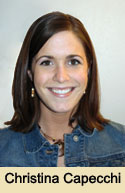Twenty Something / Christina Capecchi
‘Never forget’
this spiritual tip
 “I could never do that,” my grandma said while admiring her neighbor’s newly installed cupboards.
“I could never do that,” my grandma said while admiring her neighbor’s newly installed cupboards.
Her neighbor’s 4-year-old, Olivia, who visits grandma often, responded matter-of-factly. “That’s because you’re old,” she said.
“But you know how to play,” Olivia added, “and you’ll never forget that.”
In her youthful candor, Olivia delivered a profound compliment. To know how to play is to know how to be fully human, which is as physical as it is spiritual. Preserving that muscle memory in contemporary culture is a rare and sacred feat.
The value of our lives—professional and personal—is measured by productivity. Do you have a stuffed inbox? A long to-do list? A packed schedule? The goal is to answer in the affirmative.
If you run into someone who asks how you’ve been, the proper answer is, “Busy!” It excuses the lack of contact while conveying an important degree of activity.
Somewhere along the assembly line of pagers and smartphones, being busy became vogue. It’s the idea that you should always be in motion, having just completed one duty, heading to another. It’s the concept that life should be a continuous string of tasks, lined up with no breathing room in between.
But there’s a difference between constant motion and meaningful productivity—a distinction that’s often lost today—and setting aside playtime actually boosts the kind of productivity that is satisfying and valuable.
Just ask Dr. Stuart Brown, the founder and president of the National Institute for Play. A recovered workaholic, Brown has become an advocate of “pleasurable, apparently purposeless activity.”
That notion, the late author Brenda Ueland once wrote, “makes us busy, efficient [Americans], with our accomplishment-mania, feel uneasy and guilty.”
But your guilt will dissolve once you hear Brown’s wide-ranging list of the benefits of play. An actively playful life develops a sense of self, energizes the body, accelerates learning, prevents violence, upholds trust, reduces stress and improves problem solving.
And get this young adults: play directs us to carve lives in accord with our intrinsic talents. (So cancel that appointment with the career counselor and go shoot hoops!)
Of course, Brown wasn’t the first advocate of play. More than seven centuries ago, St. Thomas Aquinas preached that play is medicine for the soul.
“It is requisite for the relaxation of the mind,” he wrote, “that we make use of playful deeds and jokes.”
A dozen centuries before that, Jesus proclaimed, “Let the children come to me and do not prevent them; for the kingdom of God belongs to such as these” (Lk 18:16).
To be childlike, Jesus suggested, is to leapfrog many barriers to a free-flowing well of faith.
As young adults, we are instructed to depart from youth immediately, entirely. We must assume firm handshakes and long hours.
It’s fine to demonstrate professionalism with a blazer and briefcase, but if those props lead to taking yourself too seriously, your spirit will suffer.
This October, as companies turn their focus to fourth-quarter earnings, make time for play. Jump in a pile of leaves. Experiment on a pumpkin’s face. Step into a zany Halloween costume.
“Apparently purposeless activity” serves a holy purpose.
(Christina Capecchi is a freelance writer from Inver Grove Heights, Minn. E-mail her at christinacap@gmail.com.) †
 “I could never do that,” my grandma said while admiring her neighbor’s newly installed cupboards.
“I could never do that,” my grandma said while admiring her neighbor’s newly installed cupboards.